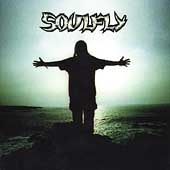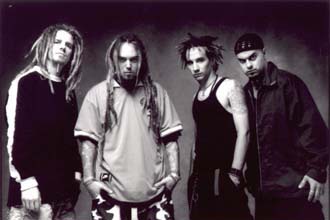|
|

Yet if seeing Max's mug got old to even some of metal's most faithful, reading the articles and interviews within these magazines became at times even more trying. It seemed as if every journalist assigned to write their respective pieces felt obligated to explain just why Max was so angry, and usually in the first paragraph or two. In other words, every Max Cavalera article began with reference to the less-than-amicable split with Sepultura (and Igor, his brother) and the murder of his stepson and friend, Dana Wells. Anger was the vibe of the interview and the new album, the journalists wanted us to know, the cathartic center that made the debut so emotionally pummelling.
What is often overlooked in this almost obsessive attention drawn towards the album's emotional sources is its end results. Soulfly is an angry album, but embedded within these ire anthems is the story of rebirth and regeneration - a trial by fire - in which you can be scorched by the flames and even decimated, yet rise like the phoenix, stronger and wiser. This theme is stated explicitly in the album's opener, "Eye for an Eye": "I hit the bottom/You don't understand/Pain . . . hate . . . pain/To be born again/Arise again/I believe is the only way." The anger of Soulfly is matched only by the inspiration derived from it, and this will to overcome is dissimenated throughout the album's entirity.
The album, however, is not flawless. This is evidenced in the unresolved tension derived from another primary dualism created inside the hour-plus CD, that of the acultural, existential pose in a slew of the songs versus the influx of cultural specificity continued from the final two Sepultura albums on which Max worked, Chaos A. D. and Roots. The attempt is noble, to fuse the radical individualism indicative of metal with a full embrace of one's cultural roots. So far, however, the experiment has failed. The two work together, in this case, like the proverbial salad bowl analogy: you can throw them together, but each retains its specific identity. In the band's defense, however, perhaps that is the point the band is trying to convey: you can never escape your culture, yet there are some things that occur on a more human level that transcend culture.
On a less philosophic level, my primary critique of the album is that it is plagued with a bit too much filler. The first six or seven songs are incredible. This string of hits culminates in "Soulfly," an instrumental whose smooth and relaxing mood seems specifically placed to wind down the first seven barnburners. Unfortunately, it can also be seen as the intro to a lackluster second side. To be quite blunt, "Umbabarauma," the homage to soccer, is an utter bore, as is "Quilombo." And although the second side has its moments - check out "Fire," "The Song Remains Insane" and "No," with its classic line, "No muthafucking Hootie and the Blowfish," something that all metalheads wish they had the opportunity to say on an album - there are too many things that detract from the album's strengths. "Prejudice," with Benji of Dub War, has a few shining spots, despite its overly pedantic stance, and the album's closer, "Karmageddon," is another nice change of pace, an instrumental once again strategically placed to sedate the hypercharged listener that closes with tribal chants.
There are too many good things happening on this album not to own it. Max Cavallera has seen his musical vision to fruition by handpicking top notch musicians who share the same vibe. Be aware: despite similarities, this is not a Sepultura rip-off, but a solid, mature musical statement by one of thrash metal's elder statesmen.
